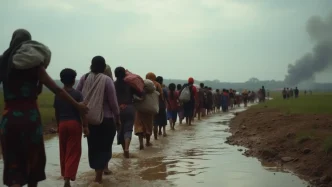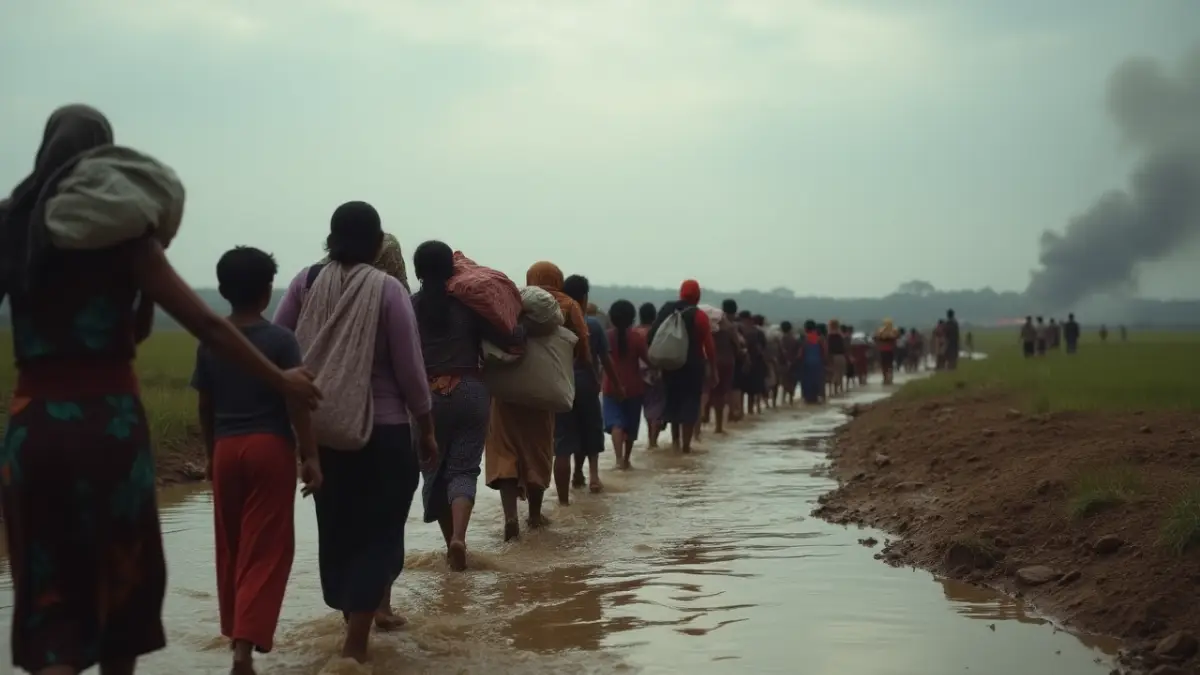In a historic move, Rohingya leaders from across the globe have launched the Arakan Rohingya National Council (ARNC), a political body aimed at unifying their fragmented community and advocating for rights, recognition, and representation. Announced on July 14, 2025, from Dhaka, Bangladesh, the formation of the ARNC marks a significant step in the long struggle of the Rohingya people, who have faced decades of persecution in Myanmar’s Rakhine State, also known as Arakan. As violence continues to displace thousands under the control of the Arakan Army (AA), this new council seeks to amplify the Rohingya voice on the international stage amid an escalating humanitarian crisis.
A Unified Voice for a Persecuted People
The ARNC emerges after nearly two years of consultations among Rohingya political figures, activists, and community representatives from inside Myanmar, refugee camps in Bangladesh, and the global diaspora. Described as “the most inclusive and unified platform ever formed to represent Rohingya communities” the council aims to bridge historical divisions and create a cohesive political front. In a media statement released on July 14, 2025, the ARNC emphasized its commitment to representing Rohingya both within Myanmar and across borders, particularly in the sprawling refugee camps of Cox’s Bazar, Bangladesh, where over a million have sought shelter.
Leading the council as chairperson is U Tun Khin, supported by a board that includes Nay San Lwin as co-chair. Speaking to local media, Nay San Lwin underscored the significance of this initiative, highlighting the quiet but determined efforts across multiple countries to overcome decades of fragmentation. The council comprises 40 Central Executive Committee (CEC) members and 60 Central Committee (CC) members, drawing delegates from nearly every township in Arakan to ensure broad representation. This structure, the ARNC claims, provides grassroots legitimacy and a foundation for sustained advocacy.
The council’s mission is clear: to reclaim and protect the Rohingya’s indigenous identity, secure their rightful citizenship in Arakan State, and advocate for a safe and just return to their homeland. Beyond this, the ARNC aims to engage in dialogue on Myanmar’s future federal structure and represent the Rohingya in international forums such as the United Nations, the Organization of Islamic Cooperation (OIC), ASEAN, and the European Union.
A Response to Decades of Persecution
The formation of the ARNC comes in direct response to what the council describes as systematic exclusion, persecution, and attempts to erase Rohingya identity. The atrocities peaked in 2017, when a military crackdown in Myanmar, widely condemned as genocide, forced approximately 750,000 Rohingya to flee to Bangladesh. The violence, perpetrated by the Burmese military regime with support from extremist groups, left communities shattered and displaced, with many seeking refuge in camps like Kutupalong in Cox’s Bazar district.
However, the crisis has not abated. According to the ARNC statement, the Arakan Army, which now controls much of Rakhine State, has continued these brutal practices. Reports detailed by the council allege widespread violence, mass killings, and destruction targeting Rohingya civilians. Last year, the AA is said to have burned large parts of Buthidaung town, looted homes, and razed dozens of villages in Buthidaung and Maungdaw townships. The ARNC estimates that nearly 150,000 Rohingya have fled to Bangladesh since the AA’s takeover, with over 2,500 killed in the ensuing violence.
Those who remain in Rakhine State live in constant fear, deprived of food, safety, and freedom, the council stated. “What is unfolding in Arakan State under the Arakan Army is nothing short of a calculated and systematic genocide” the ARNC declared in its July 14, 2025, statement. While these claims are grave, they align with reports from humanitarian organizations and local media, painting a dire picture of ongoing displacement and suffering.
Challenges of Representation and Return
The Rohingya crisis is one of the most protracted refugee situations in the world, with little progress toward repatriation or justice. The majority of displaced Rohingya reside in Bangladesh, where overcrowded camps struggle to provide basic necessities. Images from March 6, 2025, showed refugees gathering to collect relief materials at distribution points in Kutupalong Refugee Camp, a stark reminder of their dependence on international aid. Yet, conditions in the camps are often precarious, with limited access to education, healthcare, and opportunities for self-reliance.
The ARNC faces significant challenges in its mission to represent such a dispersed and traumatized community. While it claims to be the most inclusive Rohingya political body to date, integrating voices from inside Myanmar—where communication and safety are severely restricted—remains a daunting task. Additionally, the council must navigate complex geopolitical dynamics, including resistance from Myanmar’s military junta and the Arakan Army, both of which have historically opposed Rohingya rights and citizenship.
Internationally, the Rohingya cause has garnered attention but limited action. Efforts to repatriate refugees to Myanmar have stalled due to concerns over safety and the lack of guarantees for citizenship or protection. Bangladesh, hosting the largest number of Rohingya refugees, has repeatedly called for international support to facilitate their return, but progress remains elusive. The ARNC’s pledge to engage with global bodies like the UN and ASEAN could provide a new avenue for advocacy, though translating diplomatic rhetoric into tangible outcomes will require sustained effort and cooperation.
Arakan Army’s Role and Escalating Violence
The ARNC’s accusations against the Arakan Army highlight a troubling dimension of the conflict in Rakhine State. Once seen by some as a potential ally against Myanmar’s military junta, the AA has faced growing criticism for its treatment of Rohingya civilians. The council’s reports of extortion, displacement, and property destruction echo findings from independent observers, though the exact scale of violence remains difficult to verify amid restricted access to the region.
The destruction of villages in Buthidaung and Maungdaw, as described by the ARNC, underscores the vulnerability of those who remain in Rakhine State. With nearly 150,000 additional refugees fleeing to Bangladesh in recent years, the humanitarian burden on neighboring countries continues to grow. The international community has condemned the violence, but sanctions and diplomatic pressure have yet to halt the cycle of displacement and loss.
For the ARNC, addressing these immediate threats while pursuing long-term political goals presents a dual challenge. The council’s commitment to “continuously enlarging its executive bodies and expanding outreach” suggests an adaptive approach, but building trust and consensus among a community scarred by decades of division will not be easy.
A Path Forward Amid Uncertainty
The launch of the Arakan Rohingya National Council represents a beacon of hope for a people long denied agency over their future. By uniting leaders from Myanmar, refugee camps, and the diaspora, the ARNC seeks to create a political force capable of advocating for justice and return. Its focus on international engagement could elevate the Rohingya struggle, bringing renewed attention to a crisis often overshadowed by other global conflicts.
Yet, the road ahead is fraught with obstacles. The ongoing violence in Rakhine State, coupled with the entrenched opposition of powerful actors in Myanmar, poses an existential threat to the Rohingya’s survival and identity. For the ARNC to succeed, it must not only maintain internal cohesion but also secure meaningful support from global stakeholders committed to human rights and accountability.
As the council initiates its outreach campaign through the Global Rohingya Coordination Council, the eyes of the world are on Arakan. Whether this unified political voice can translate into safety, recognition, and a dignified return for the Rohingya remains an open question—one that will shape the future of a people who have endured unimaginable hardship for far too long.















